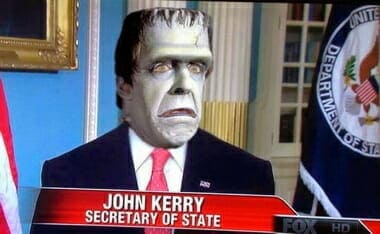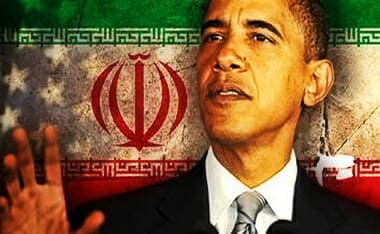Secretary of State Mike Pompeo on former Secretary John Kerry: “What Secretary Kerry has done is unseemly and unprecedented.” He also says: “Secretary Kerry ought not to engage in that kind of behavior.”
POWERLINE: “What Secretary Kerry Has Done Is Unseemly And Unprecedented”
Yesterday morning I revisited former Obama administration Secretary of State John Kerry’s coaching of the powers that be in Iran on the fine art of resistance to the Trump administration. Yesterday afternoon Trump administration Secretary of State Mike Pompeo was asked at a press conference (transcript here) about Kerry’s freelance diplomacy, as Michael Rubin calls it in this excellent New York Post column. Pompeo responded: “What Secretary Kerry has done is unseemly and unprecedented. This is a former Secretary of State engaged with the world’s largest state sponsor of terror…” Going further, Pompeo condemned Kerry’s conduct as “beyond inappropriate.”
Pompeo spoke firmly but diplomatically, as befits the office he holds, but how sweet the sound of Kerry being called out by a Secretary of State seeking to squeeze the Iranians into civilized norms of behavior….
(Watch Ari Fleischer’s reaction)
LEGAL INSURRECTION lays down the law:
“did not deny the suggestion he’s telling the Iranians to wait out Trump until there is a Democratic president again”
[….]
This is serious. Michael Rubin writes at the Washington Examiner:
John Kerry deserves jail for secret Iran diplomacy
Kerry has always been an arrogant and aloof man. During his long career on Capitol Hill, Senate colleagues on both sides of the aisle described him as the least-liked senator, an opinion repeatedly affirmed by his own office staff during his long career. He is disdainful of democracy. Simply put, he sees himself as above the law, deserving of privilege and special dispensation not only when he is in government, but also as a private citizen.
Perhaps Kerry believes he is not violating the Logan Act of 1799 which states that: “Any citizen of the United States, wherever he may be, who, without authority of the United States, directly or indirectly commences or carries on any correspondence or intercourse with any foreign government or any officer or agent thereof, in relation to any disputes or controversies with the United States, or to defeat the measures of the United States, shall be fined under this title or imprisoned not more than three years, or both.”
Trump responded Thursday night. Brooke Singman reports at FOX News:
President Trump and John Kerry entered into a war of words on Twitter Friday, with the president suggesting the former secretary of state had “illegal meetings” with the Iranian regime, and Kerry suggesting the commander-in-chief should be more concerned with the Russia investigation.
“John Kerry had illegal meetings with the very hostile Iranian Regime, which can only serve to undercut our great work to the detriment of the American people. He told them to wait out the Trump Administration! Was he registered under the Foreign Agents Registration Act? BAD!” Trump tweeted Thursday night.


